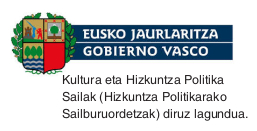Development and validation of the Cooperative Person Scale – Short version (Koophezi-i-S)
DOI:
https://doi.org/10.26876/uztaro.131.2024.5092Keywords:
Cooperative Person scale, Scale development, Confirmatory factor analysis, Educational assessmentAbstract
In this paper we describe the validation of a short version of the Koophezi-i scale to measure the Cooperative Person (CP) profile of 16-22 year-old students. The sample comprised 2.290 students (48.6% female, 51.4% male) from 14 university faculties and high schools in the Basque Country. In our first study, we use the original 10 factors and 37 items measured in the Koophezi -i CP profile. Four different confirmatory models were tested. In the second study, a content validity analysis was performed. As a result, a validated Koophezi-i-S scale was generated, which comprised 7 factors and 21 items. The limitations and implications of this new scale are discussed.
Downloads
References
American Educational Research Association, American Psychological Association & National Council on Measurement in Education (2014). Standards for educational and psychological testing. Author.
Auné, Sofía; Abal, Facundo, & Attorresi, Horacio (2016). Diseño y construcción de una escala de conducta prosocial para adultos. Revista Iberoamericana de Diagnóstico y Evaluación – e Avaliação Psicológica, RIDEP, 42(2), 15-25. https://doi.org/10.21865/RIDEP42_15
Azkarate-Iturbe, Oxel; Aritzeta, Aitor; Lezeta, Ion; Vitoria, Jose Ramon; Galletebeitia, Iban; Sanchez, Ane, & Zubizarreta, Miren (2019). Koophezi-i: Pertsona Kooperatiboaren Profila Ikasle Gazteetan Neurtzeko Eskala. Mondragon Unibertsitatea. http://ebiltegia.mondragon.edu/xmlui/bitstream/handle/20.500.11984/1813/Koophezi-i. pdf?sequence=1&isAllowed=y
Azkarate-Iturbe, Oxel; Vitoria, Jose Ramon; Aritzeta, Aitor, & Galletebeitia, Iban (2020). Persona Cooperativa en un contexto de transformación educativa y social. REVESCO, Revista De Estudios Cooperativos, 136, e71859. https://doi.org/10.5209/reve.71859
Azkarate-Iturbe, Oxel (2021). Pertsona Kooperatiboa profila ikasle gazteetan neurtzeko Koophezi-i tresnaren sorkuntza eta balioztatzea [Doktorego-tesia]. Mondragon Unibertsitatea.
Boletín Oficial del Estado (2015). Orden ECD/65/2015, de 21 de enero, por la que se describen las relaciones entre las competencias, los contenidos y los criterios de evaluación de la educación primaria, la educación secundaria obligatoria y el bachillerato. https://www.boe.es/boe/dias/2015/01/29/pdfs/BOE-A-2015-738.pdf
Bonk, Curtis Jay, & Cunningham, Donald (1998). Searching for learner-centered, constructivist, and sociocultural components of collaborative educational learning tools. In Curtis Jay Bonk & Kira King (argtz.), Electronic collaborators: Learner-centered technologies for literacy, apprenticeship, and discourse (25-50. or.). Lawrence Erlbaum Associates.
Bray, Aibhín; Byrne, Philip, & O’Kelly, Michelle (2020). A Short Instrument for Measuring Students’ Confidence with «Key Skills» (SICKS): Development, Validation and Initial Results. Thinking Skills and Creativity, 100.700. https://doi.org/10.1016/j.tsc.2020.100700
Brouard, François, & Larivet, Sophie (2010). Essay of clarifications and definitions of the related concepts of social enterprise, social entrepreneur and social entrepreneurship. In Alain Fayolle & Harry Matlay (argtz.), Handbook of research on social entrepreneurship (29-56. or.). Edward Elgar Publishing Limited.
Brown, Timothy (2015): Confirmatory Factor Analysis for Applied Research. Guilford publications.
Campion, Michael. A; Medsker, Gina. J., & Higgs, A. Catherine (1993). Relations between work group characteristics and effectiveness: implications for designing effective work groups. Personnel Psychology, 46(4), 823-850. https://doi.org/10.1111/j.1744-6570.1993.tb01571.x
Care, Esther (2018): Twenty-First Century Skills: From Theory to Action. In Esther Care, Patrick Griffin & Mark Wilson (argtz.), Assessment and Teaching of 21st Century Skills: Research and Applications: Vol. 3, (3-17. or.). Springer.
Carlo, Gustavo; Eisenberg, Nancy, & Knight, George (1992). An Objective Measure of Adolescents’ Prosocial Moral Reasoning. Journal of Research on Adolescence, 2(4), 331-349. https://doi.org/10.1207/s15327795jra0204_3
Clamp, Christina. A., & Alhamis, Innocentus (2010). Social Entrepreneurship in the Mondragon Co-operative Corporation and the Challenges of Successful Replication. The Journal of Entrepreneurship, 19(2), 149-177. https://doi.org/10.1177/097135571001900204
Dings, Alexander, & Spinath, Frank. M. (2021). Motivational and personality variables distinguish academic underachievers from high achievers, low achievers, and overachievers. Social Psychology of Education, 24, 1.461-1.485. https://doi.org/10.1007/s11218-021-09659-2
Duckworth, Angela, & Quinn, Patrick. D (2009). Development and Validation of the Short Grit Scale. Journal of Personality Assessment, 91(2), 166-174. https://doi.org/10.1080/00223890802634290
Edwards-Schachter, Mónica; García-Granero, Ana; Sánchez-Barrioluengo, Mabel; Quesada-Pineda, Henry, & Amara, Nabil (2015). Disentangling competences: Interrelationships on creativity, innovation and entrepreneurship. Thinking Skills and Creativity, 16, 27-39. https://doi.org/10.1016/j.tsc.2014.11.006
Ferris, Gerald; Witt, L.A., & Hochwarter, Wayne. A. (2001). Interaction of social skill and general mental ability on job performance and salary. Journal of Applied Psychology, 86(6), 1.075-1.082. https://doi.org/10.1037/0021-9010.86.6.1075
Filippou, Dimitra; Buchs, Céline; Quiamzade, Alain, & Pulfrey, Coroline (2021). Understanding motivation for implementing cooperative learning methods: a value-based approach. Social Psychology of Education, 1-40. https://doi.org/10.1007/s11218-021-09666-3
Francis, Leslie; Brown, Laurence, & Philipchalk, Ronald (1992). The development of an abbreviated form of the Revised Eysenck Personality Questionnaire (EPQR-A): nIts use among students in England, Canada, the U.S.A and Australia. Personality and Individual Differences, 13(4), 443-449.
Gonzalez-Mulé, Erik; DeGeest, David; McCormick, Brian; Seong, Jee Young, & Brown, Kenneth (2014). Can we get some cooperation around here? The mediating role of group norms on the relationship between team personality and individual helping behaviors. Journal of Applied Psychology, 99(5), 988-999. https://doi.org/10.1037/a0037278
Gresham, Frank. M., & Elliott, Stephen. N. (1990). Social Skills Rating System. Pearson Assessments.
Gresham, Frank. M., & Elliott, Stephen. N. (2008). Social Skills improvement System-Rating Scales. Pearson Assessments.
Griffin, Patrick; Care, Esther, & McGaw, Barry (2012). The changing role of education and schools. In Patrick Griffin; Barry McGaw & Esther, Care (argtz.), Assessment and teaching of 21st century skills (1-15. or.). Springer.
Heckman, James. J., & Kautz, Tim (2012). Hard evidence on soft skills. Labour Economics, 19(4), 451-464. https://doi.org/:10.1016/j.labeco.2012.05.014
Hockerts, Kai (2015). The Social Entrepreneurial Antecedents Scale (SEAS): A Validation Study. Social Enterprise Journal, 11(3), 260-280. https://doi.org/10.1108/SEJ-05-2014-0026
Hu, Li-Tze, & Bentler, Peter. M. (1999). Cutoff Criteria for Fit Indexes in Covariance Structure Analysis: Conventional Criteria versus New Alternatives. Structural Equation Modeling, 6, 1-55. http://dx.doi.org/10.1080/10705519909540118
Imaz, Ainara, & Ipiña, Nagore (2020). Berrikuntza prozesu baten mapa berria: eraldaketaren eredua. Etorkizuneko irakasleen formazioan eragiten. Mondragon Unibertsitatea.
International Cooperative Alliance (1995). Statement on the cooperative identity. International Cooperative Alliance. https://ica.coop/en/whats-co-op/co-operative-identityvalues-principles
Jilinskaya-Pandey, Mariya, & Wade, Jeremy (2019). Social Entrepreneur Quotient: An International Perspective on Social Entrepreneur Personalities. Journal of Social Entrepreneurship, 1-23. https://doi.org/10.1080/19420676.2018.1541013
Johnson, David. W. & Johnson, Roger. T. (2014). Cooperative Learning in 21st Century. [Aprendizaje cooperativo en el siglo XXI]. Anales de Psicología/Annals of Psychology, 30(3), 841-851. https://doi.org/10.6018/analesps.30.3.201241
Kautz, Tim; Heckman, James; Diris, Ron; Ter Weel, Bas, & Borghans, Lex (2014). Fostering and Measuring Skills: Improving Cognitive and Non-cognitive Skills to Promote Lifetime Success. Organization for Economic Co-operation and Development. https://doi.org/10.3386/w20749
Koole, Sander. L; Jager, Wander; Van den Berg, Agnes. E; Vlek, Charles. A.J., & Hofstee, Willem. K.B. (2001). On the Social Nature of Personality: Effects of Extraversion, Agreeableness, and Feedback about Collective Resource Use on Cooperation in a Resource Dilemma. Personality and Social Psychology Bulletin, 27(3), 289-301. https://doi.org/10.1177/0146167201273003
Levy, Barry. S., & Patz, Jonathan. A. (2015). Climate Change, Human Rights, and Social Justice. Annals of Global Health, 81(3), 310. https://doi.org/10.1016/j.aogh.2015.08.008
Matthews, Gerald (2020). A Grand Challenge for Personality and Social Psychology: Competition, Cooperation, or Co-existence? Frontiers in Psychology, 11. 1.570. https://doi.org/10.3389/fpsyg.2020.01570
Meneses, Julio; Barrios, Maite; Bonillo, Albert; Cosculluela, Antoni; Lozano, Luis Manuel; Turbany, Jaume, & Valero, Sergi (2013). Psicometría. Editorial UOC.
Mestre, Vicente; Frías, Dolores; Samper, Paula, & Tur, Ana (2002). Adaptación y validación en población española del PROM: una medida objetiva del razonamiento moral prosocial. Acción Psicológica, 3, 221-232. http://e-spacio.uned.es/fez/eserv/bibliuned:AccionPsicologica2002-numero3-0001/Documento.pdf
Mikulic, Isabel María; Crespi, Melina, & Radusky, Pablo (2015). Construcción y validación del inventario de competencias socioemocionales para adultos (ICSE). Interdisciplinaria, 32(2), 307-329. https://doi.org/10.16888/interd.2015.32.2.7
Nicolás, Catalina, & Rubio, Alicia (2018). Características cognitivas del emprendedor social en España. Acciones E Investigaciones Sociales, 38, 153-176. https://doi.org/10.26754/ojs_ais/ais.2018382980
Paez, Javier, & De-Juanas, A (2015). Validation of «Schwartz Values Scale» for spanish adolescents population. Procedia-Social and Behavioral Sciences, 165, 195-201. https://doi.org/10.1016/j.sbspro.2014.12.622
Penuel, William; Riedy, Robbin; Barber, Michael; Peurach, Donald; LeBouef, Whitney, & Clark, Tiffany (2020). Principles of Collaborative Education Research With Stakeholders: Toward Requirements for a New Research and Development Infrastructure. Review of Educational Research, 90. https://doi.org/003465432093812.10.3102/0034654320938126
Peredo, Ana María, & McLean, Murdith (2006). Social entrepreneurship: A critical review of the concept. Journal of World Business, 41(1), 56-65. https://doi.org/10.1016/j.jwb.2005.10.007
Proto, Eugenio; Rustichini, Aldo, & Sofianos, Andis (2019). Intelligence, Personality, and Gains from Cooperation in Repeated Interactions. Journal of Political Economy, 127(3), 1.351-1.390. https://doi.org/10.1086/701355
Rasipuram, Sowmya, & Jayagopi, Dinesh Babu (2020). Automatic multimodal assessment of soft skills in social interactions: a review. Multimedia Tools and Applications, 79(19), 13.037-13.060. https://doi.org/10.1007/s11042-019-08561-6
Sandin, Bonifacio; Valiente, Rosa. M; Chorot, Paloma; Olmedo, Margarita, & Santed, Miguel. A (2002). Versión Española del cuestionario EPQR-Abreviado (EPQR-A) (I): Análisis exploratorio de la estructura factorial. Revista de Psicopatología y Psicología Clínica, 7(3), 195-205. http://revistas.uned.es/index.php/RPPC/article/viewFile/3933/3787
Schwartz, Shalom H. (2003). A proposal for measuring value orientations across nations. Questionnaire package of the European social survey, 259(290), 259-319.
Schwartz, Shalom H. (2012). An overview of the Schwartz theory of basic values. Online Readings in Psychology and Culture, 2(1). https://doi.org/10.9707/2307-0919.1116
Schwarzer, Ralf, & Jerusalem, Matthias (1995). Generalized Self-Efficacy scale. In J. Weinman; S. Wright & M. Johnston (argtz.), Measures in health psychology: A user’s portfolio. Causal and control beliefs (35-37. or.). NFER-NELSON.
Selznick, Benjamin S., & Mayhew, Matthew J. (2018). Measuring Undergraduates’ Innovation Capacities. Research in Higher Education, 59(6), 744-764. https://doi.org/10.1007/s11162-017-9486-7
Shoreman-Ouimet, Eleanor, & Kopnina, Helen (2015). Reconciling ecological and social justice to promote biodiversity conservation. Biological Conservation, 184, 320-326. https://doi.org/10.1016/j.biocon.2015.01.030
Silva, Helena; Caravau, Hilma; Amorim, Marlene, & Dias, Marta F. (2016). Social entrepreneur: Does literature match reality? In Alexandra Zbuchea & Dimotrios Nikolaidis (argtz.), Responsible entrepreneurship visio, developement and ethics (199-209.
or.). Comunicari.ro.
Thiele, Lisa; Sauer, Nils Christian, & Kauffeld, Simone (2018). Why extraversion is not enough: the mediating role of initial peer network centrality linking personality to long-term academic performance. Higher Education, 76(5), 789-805. https://doi.org/10.1007/s10734-018-0242-5
Tierney, Pamela, & Farmer, Steven. M. (2002). Self-efficacy: Its potential antecedents and relationship to creative performance. Academy of Management Journal, 45(6), 1.137-1.148. https://doi.org/10.2307/3069429
Tseng, Hungwei; Yi, Xiang, & Yeh, Hesin-Te (2019). Learning-related soft skills among online business students in higher education: Grade level and managerial role differences in self-regulation, motivation, and social skill. Computers in Human Behavior, 95, 179-186. https://doi.org/10.1016/j.chb.2018.11.035
Valtonen, Teemu; Hoang, Nhi; Sointu, Erkko; Näykki, Piia; Virtanen, Anne; Pöysä-Tarhonen, Johanna; Häkkinen, Päivi; Järvelä, Sanna; Mäkitalo Kati, & Kukkonen, Jari (2021).
How pre-service teachers perceive their 21st-century skills and dispositions: A longitudinal perspective. Computers in Human Behavior, 116, 106.643. https://doi.org/10.1016/j.chb.2020.106643
Volk, Stefan; Thöni, Christian, & Ruigrok, Winfried (2011). Personality, personal values and cooperation preferences in public goods games: A longitudinal study. Personality and Individual Differences, 50(6), 810-815. https://doi.org/10.1016/j.paid.2011.01.001
Yu, Chuapeng, Ye, Baosheng, & Ma, Shenghui (2021). Creating for others: linking prosocial motivation and social entrepreneurship intentions. Management Decision, 59(11), 2.755-2.773. https://doi.org/10.1108/MD-06-2019-0815
Zhao, Hao; Seibert, Scott, & Hills, Gerald (2005). The mediating role of self-efficacy in the development of entrepreneurial intentions. Journal of Applied Psychology, 90(6), 1.265-1.272. https://doi.org/10.1037/0021-9010.90.6.1265
Zhou, Kai (2017). Non-cognitive skills: Potential candidates for global measurement. European Journal of Education, 52(4), 487-497. https://doi.org/10.1111/ejed.12241
Zubizarreta, Miren, & Aritzeta, Aitor (2015). The Development of the Entrepreneurial Culture. In N. Van Hattum-Janssen, R.M. Lima, D. Carvalho, S. Fernandes, R.M. Sousa, F. Moreira, A. Alves, et al. (argtz.), PAEE 2015 International Symposium on Project Approaches in Engineering Education (420-427. or.). Department of Production and Systems - PAEE association. http://paeeale.unb.br/_upload/PAEE2015_proceedings.pdf
License
Copyright (c) 2024 Oxel Azkarate Iturbe, Aitor Aritzeta, Rosa Mindeguia, Jose Ramon Vitoria

This work is licensed under a Creative Commons Attribution-NonCommercial-ShareAlike 4.0 International License.




















